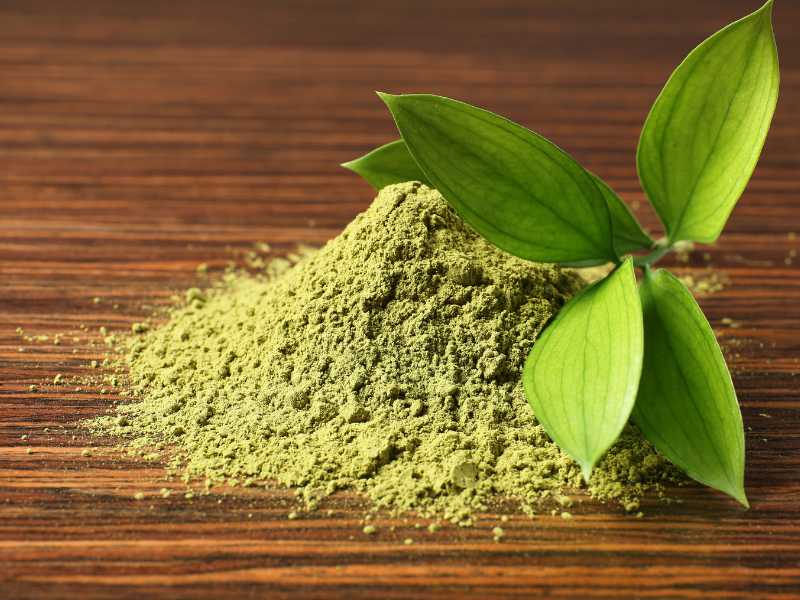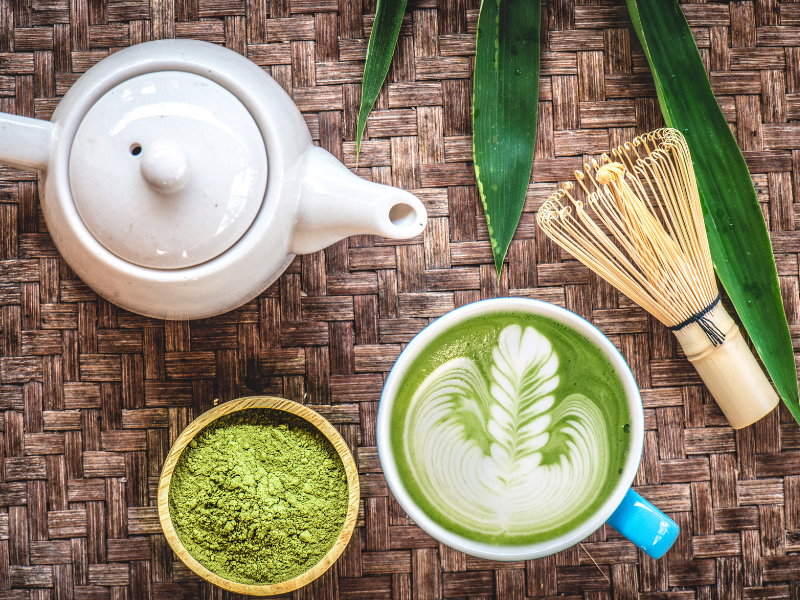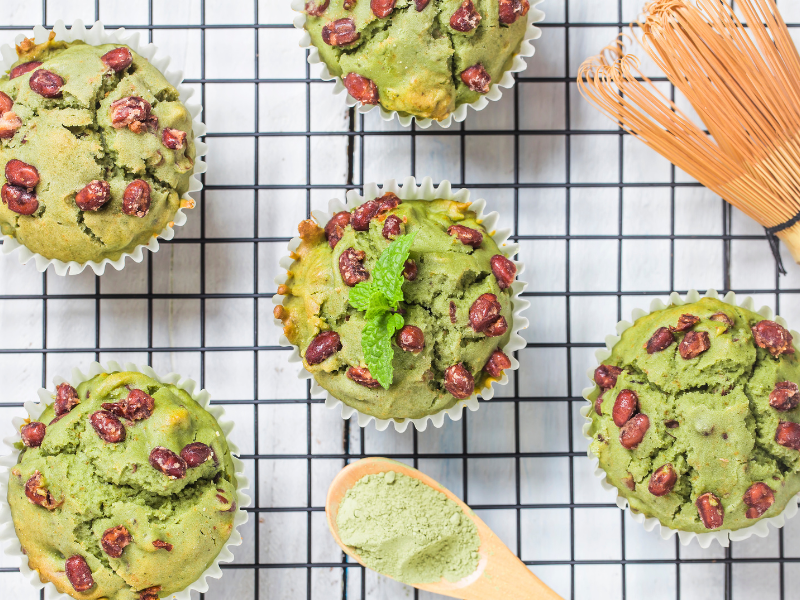


Matcha has been all the rave for some time now, but what do we really know about it aside from its delicious aesthetic? Is it just a pretty-looking trendy ingredient, or does it actually have health benefits that can make a difference to your lifestyle? In this article, we dig deep to understand the nutritional hack and answer the question, “Is matcha good for you”?, along with a recipe to enjoy the widely loved Matcha green tea!
What is Matcha?

Matcha is a fine powder that is a product of green tea leaves – the camellia sinensis plant to be precise. It has a strong umami taste and is a vibrant green color, which is a result of boosted chlorophyll from the plants being grown in the shade [1]. Matcha powder is used in a variety of products like smoothies, ice cream, baked goods, etc, but is most commonly found in the form of matcha green tea.
Nutritional Profile of Matcha
As the entire tea leaf is consumed with matcha, there are loads of vitamins, minerals, antioxidants that are extracted through it [2].
- Matcha contains vitamins A, B1, B2, B6, C, E, and K.
- The antioxidants it contains include epigallocatechin-3-gallate and catechins, which help in preventing cell damage
- Matcha includes minerals like magnesium, calcium, zinc, phosphorous, iron, and potassium.
- The caffeine content in matcha is also relatively higher in comparison to other teas, but the theanine balances some of the caffeine which helps with having just a good dose of alertness.
- Other additional nutrients include plant protein, unsaturated fatty acids, and dietary fiber.
Learn more about other beverages:
Jasmine Tea: Reasons Why You Should Drink It
Can You Drink Coffee While Fasting?
Health Benefits of Drinking Matcha Tea

Matcha is packed with antioxidants, caffeine, and amino acids, providing various health advantages:
- Heart Health: Similar to green tea, matcha may help lower the risk of heart disease by reducing oxidative stress and inflammation [3].
- Brain Function: It can enhance focus, memory, and reaction time, likely due to its caffeine content.
- Liver Health: Matcha may lower the risk of liver issues, including liver cancer [4].
- Cancer Protection: The catechins in matcha may help prevent DNA damage and inhibit tumor growth [5].
- Dental Health: Matcha may reduce plaque, bad breath, and improve gum health [6].
- Inflammation: The antioxidants in matcha can help minimize inflammation, potentially preventing chronic diseases.
- Weight Management: It can increase metabolism and fat burning, particularly with regular exercise.
- Gut Health: Matcha helps promote healthy gut bacteria, improving digestion and immune function [7].
In summary, matcha provides multiple health benefits, including support for heart and brain health, weight management, and digestion, especially when consumed in moderation and in its purest form.
How to Prepare Homemade Matcha Green Tea

Making matcha green tea is simple, but it requires a few extra steps compared to regular tea. Here’s how to do it:
- Boil water: Heat 8 to 12 ounces of water and pour it into a mug.
- Sift the matcha powder: Sift 1 to 2 scoops of matcha powder (depending on your desired strength) into a small bowl or mug to prevent clumps.
- Whisk the matcha: Add a small amount of hot water to the powder and whisk vigorously from side to side (in a zigzag or back-and-forth motion). This helps disperse the powder evenly and creates a frothy layer on top. Avoid circular motions as they won’t create foam.
- Add more water or milk: Top the tea with additional hot water or steamed milk for a latte-style drink. You can use almond milk, coconut milk, or oat milk.
- Sweeten if desired: Add honey or sugar to taste for a sweeter flavor.
Whisk again until frothy, and enjoy your freshly made matcha tea!
Choosing the Right Matcha

When selecting matcha, choose one that has a vibrant green color and a smooth, fine texture, as these are signs of high quality. Look for packaging that protects the product from air and light, and keep in mind that premium matcha tends to cost more due to its meticulous production process. You can also add matcha powder to various recipes for both health benefits and culinary creativity.
It is available in three main grades:
- Culinary Grade: The most affordable, perfect for cooking and baking.
- Premium Grade: Made from top leaves, this is great for drinking as tea.
- Ceremonial Grade: The highest quality, made from the youngest leaves, offering superior flavor and nutrients.
You can find matcha at grocery stores or online. Once opened, store it in an airtight container in the fridge or freezer to keep it fresh for up to two months.
Safety and Precautions
Matcha green tea is generally believed to be a safe drink, but as always if you’re unsure due to any medical conditions it’s always best to check in with your doctor. The high caffeine content is something to take note of if you wish to limit your intake. Pregnant women and those affected by iron deficiency as it can have an impact on iron absorption.
Learn more nutritional hacks:
Delicious Bland Diet Recipes to Still Keep it Interesting
Avocado Side Effects: 8 Things You Should Know
Why I Stopped Eating Oatmeal: A Deeper Look Into the Popular Breakfast Choice
Conclusion
Matcha or matcha green tea is a great option to consider if you’re looking for a low-calorie, unsweetened hot drink, but also as a base for numerous other delicious products. The health benefits of matcha are numerous. We hope you found this nutritional tip useful, and if you would like to learn more about how you can lead an active and healthier lifestyle every day, check out the JustFit app!
Is drinking matcha every day good for you?
Are there any negative effects to matcha?
Is matcha good or bad for weight loss?
Babu, P. V., & Liu, D. (2008). Green tea catechins and cardiovascular health: an update. Current medicinal chemistry, 15(18), 1840–1850. Available at: https://doi.org/10.2174/092986708785132979
Farhan M. (2022). Green Tea Catechins: Nature's Way of Preventing and Treating Cancer. International journal of molecular sciences, 23</i><span style="font-weight: 400;">(18), 10713. Available at: https://doi.org/10.3390/ijms231810713
Takegami, M., Hamaguchi, M., Miyoshi, T., Munekawa, C., Yoshimura, T., Nakajima, H., Kimura, T., Okamura, T., Hashimoto, Y., Nakanishi, N., Kitao, Y., Kinoshita, K., & Fukui, M. (2022). Effect of matcha consumption on gut microbiota in healthy Japanese individuals: study protocol for a double-blind crossover interventional study. Journal of clinical biochemistry and nutrition</span>, 70(3), 262–265. Available at: https://doi.org/10.3164/jcbn.21-110
The journey of matcha: From leaf to powder. Riching Matcha. (2024, September 2). Available at: https://richingmatcha.com/the-journey-of-matcha-from-leaf-to-powder/
Matcha Nutrition and health benefits. Keicha Tea World. (n.d.). Available at: https://keichamatcha.com/blogs/tea-news/matcha-powder-health-benefits#:~:text=It%20also%20has%20minerals%20such,intake%20of%20vitamin%20A%20carotene.
Vyas, T., Nagi, R., Bhatia, A., & Bains, S. K. (2021). Therapeutic effects of green tea as an antioxidant on oral health- A review. Journal of family medicine and primary care, 10(11), 3998–4001. Available at: https://doi.org/10.4103/jfmpc.jfmpc_943_21
Zhou, J., Yu, Y., Ding, L., Xu, P., & Wang, Y. (2021). Matcha Green Tea Alleviates Non-Alcoholic Fatty Liver Disease in High-Fat Diet-Induced Obese Mice by Regulating Lipid Metabolism and Inflammatory Responses. Nutrients, 13(6), 1950. Available at: https://doi.org/10.3390/nu13061950





